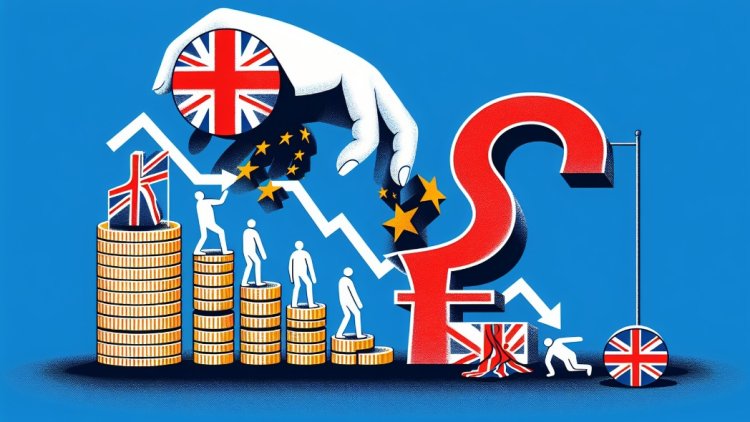The Economic Effects of Brexit: A Comprehensive Analysis
Unravel the tangled threads of Brexit's economic impact: Explore trade disruptions, investment shifts, growth trajectories, and diverse sectoral consequences. Dive into a comprehensive analysis with data, insights, and balanced perspectives.

Introduction
In this segment, we shall present a comprehensive outline of the economic measures that have been implemented after the referendum on Brexit. In this discussion, we shall delve into the absence of a well-constructed argument supporting the economic advantages of Brexit as well as the deliberate silence among politicians regarding its consequences. Additionally, we shall examine the repercussions of the United Kingdom's choice to depart from the European Union, which can be perceived as an act of self-inflicted economic damage.
-
An overview of the economic policies that have been put in place since the Brexit vote.
-
The lack of a coherent case for the economic benefits of Brexit.
-
The political conspiracy of silence surrounding the effects of Brexit.
-
The act of economic self-harm caused by the UK's decision to leave the EU.
In the wake of the Brexit referendum, the United Kingdom has introduced a range of economic measures intending to effectively manage its withdrawal from the European Union. The implementation of these policies was guided by a specific concept of sovereignty, placing a higher emphasis on autonomy than economic feasibility. Nevertheless, the consequences of these policies have been anything but favorable.
The proponents of Brexit, commonly known as Brexiters, have been unable to articulate a coherent and persuasive argument regarding the economic advantages of leaving the European Union. The anticipated benefits of a Brexit dividend and a prosperous future outside the European Union have not yet come to fruition. On the contrary, we are currently observing the adverse repercussions stemming from this particular choice.
It appears that there is a prevailing tendency among political circles to avoid engaging in open dialogue regarding the ramifications of Brexit. Both the government and the Labour Party have refrained from acknowledging or addressing the economic consequences. The absence of communication and clarity regarding the consequences of Brexit is being needlessly prolonged.
The choice to depart from the European Union can be perceived as a deliberate action that inflicts damage on one's own economy. The United Kingdom has encountered adverse consequences about pricing, investment, and trade. The observed consequences can be directly attributed to Brexit rather than being influenced by external factors such as the pandemic or energy crises. The impact of Brexit on the UK economy has been undeniably detrimental.
Negative Effects on Trade and Prices
The choice to depart from the European Union, more commonly referred to as Brexit, has resulted in several adverse consequences for trade and prices within the United Kingdom. The aforementioned effects can be directly attributed to the depreciation of the pound and its subsequent repercussions on both imports and exports.
One of the immediate repercussions of Brexit was the depreciation of the pound among other currencies. The decision to enhance exports has indeed bolstered their competitiveness, but it has also resulted in a rise in the prices of imports. Consequently, enterprises dependent on imported goods encountered elevated expenses, which were subsequently transferred to consumers.
The rise in import prices has directly influenced inflation, resulting in a reduction in the buying ability of households. Indeed, it is worth noting that inflation experienced an increase of approximately 2 to 3 percent, resulting in a decline in individuals' financial well-being and subsequently limiting their capacity to procure various commodities and services.
According to estimates, the direct financial impact of Brexit on households is projected to be approximately £870 per household. This encompasses the elevated costs of imported commodities and the general decline in the ability to make purchases.
Brexit has had a significant impact on businesses in different industries, resulting in increased expenses. As an illustration, Aston Chemicals, a distributor specializing in the trade of chemicals, encountered a rise in transportation expenses and an escalation in the prices of products denominated in US dollars.
The adverse consequences of Brexit are evident in the comparative performance of the United Kingdom's economy when juxtaposed with other advanced economies. Contrary to the trade rebound observed in other nations following the pandemic, the United Kingdom's trade intensity exhibited a stagnant trend. Furthermore, there has been a notable decline in the volume of trade partnerships between smaller businesses in the United Kingdom and their international counterparts.
It can be deduced that the phenomenon of Brexit has yielded considerable adverse consequences for both trade and prices within the United Kingdom. Brexit has resulted in a series of significant repercussions, including the depreciation of the pound, elevated import prices, inflation, and amplified expenses for businesses. The aforementioned effects have had a significant impact on households, businesses, and the overall economic performance of the United Kingdom.
Disrupting Business Operations
Given the United Kingdom's current process of disentangling from the European Union, businesses are facing numerous challenges in adjusting to new customs regulations. The existing challenges are leading to disruptions in the functioning of businesses and impacting various aspects of trade and supply chains.
Challenges faced by businesses in dealing with new customs regulations
Businesses have encountered considerable difficulties due to the introduction of fresh customs regulations. In light of recent developments, companies are now faced with the intricate task of managing intricate paperwork, tariffs, and customs procedures that were previously not applicable to them due to their membership in the European Union. The aforementioned circumstances have led to a rise in the number of administrative tasks, as well as the prolongation of delivery times and the imposition of additional expenses on enterprises.
Case studies of companies relocating or altering their operations due to Brexit
Numerous companies have been compelled to make the arduous choice of either relocating or modifying their operations due to the consequences brought about by Brexit. As an illustration, Aston Chemicals, a distributor specializing in chemicals, encountered a rise in transportation expenses and an escalation in the prices of products denominated in US dollars. Some companies, like Little Star Jewellery, have made the strategic decision to relocate their European business operations to countries within the European Union to circumvent trade barriers and lower expenses.
Impact on supply chains and trade relationships with EU countries
The decision to leave the European Union, commonly known as Brexit, has had a notable influence on supply chains and trade connections with countries in the European Union. The depreciation of the pound and subsequent rise in import prices have resulted in elevated expenses for businesses that depend on imported goods. The aforementioned circumstances have had a significant impact on trade partnerships and have hindered the capacity of smaller British enterprises to broaden their reach in European markets. There has been a notable decline in the quantity of trade connections between smaller businesses in the United Kingdom and their international counterparts.
Increased bureaucracy and its effect on small businesses
One of the noteworthy outcomes arising from Brexit is the heightened level of bureaucracy that businesses, especially those of smaller scale, must now grapple with. The businesses are facing additional administrative burdens and costs due to the necessity of adhering to new customs procedures and regulations. Numerous small enterprises have encountered difficulties in adjusting to the recent regulations, leading to setbacks, increased administrative tasks, and supplementary financial burdens.
The various consequences of Brexit, such as changes in customs regulations, supply chain disruptions, altered trade relationships, and heightened bureaucracy, have had a substantial influence on businesses operating in the United Kingdom. Many companies are still prioritizing the task of navigating the challenges posed by Brexit and seeking strategies to minimize its adverse impacts.
Decline in Business Investment
In the aftermath of the Brexit referendum, the United Kingdom has witnessed a notable decrease in business investment, distinguishing it from its counterparts in the Group of Seven (G7) nations. While several nations have experienced an upswing in business investment, the United Kingdom has reached a stagnant phase, which can be attributed to the discernible impact of Brexit.
The decline in support for Brexit can be attributed to the absence of a persuasive argument showcasing its economic advantages. The anticipated benefits of a Brexit dividend and a prosperous future outside the European Union have not yet come to fruition. The adverse repercussions of the decision to withdraw from the European Union are increasingly evident.
There appears to be a prevailing political conspiracy of silence regarding the consequences of Brexit. Both the government and the Labour Party have refrained from acknowledging or addressing the economic consequences, thereby perpetuating a state of opacity and limited comprehension.
To encourage investment, the government has implemented measures such as the super deduction, which provides substantial allowances for capital and innovation investments. Unfortunately, despite these endeavors, the decline has persisted without any signs of reversal.
The worrisome implications of the decrease in business investment on the long-term trajectory of the UK economy are cause for concern. Investment plays a pivotal role in fostering economic growth and facilitating the expansion and innovation of businesses. Without substantial investment, the United Kingdom may face challenges in competing on a global scale and fully unlocking its economic capabilities.
Impact on the Younger Generation and Future Prospects
The choice to depart from the European Union, commonly referred to as Brexit, has had a notable influence on the younger demographic and their prospects for the future. The imposition of various limitations on travel, employment, and financial ventures has presented a multitude of obstacles for the younger generation. These restrictions have not only curtailed their prospects but also impeded their capacity to flourish in an interconnected global society.
One of the primary ramifications of Brexit for the younger demographic entails the imposition of limitations on both travel and employment opportunities. Before the occurrence of Brexit, it was relatively effortless for young individuals to engage in travel, reside, and pursue employment opportunities within the European Union, encountering minimal hindrances along the way. Nevertheless, the cessation of unrestricted movement has resulted in an increase in bureaucratic obstacles for young individuals. These hurdles encompass the acquisition of visas or work permits, which are now mandatory prerequisites for those aspiring to explore prospects within Europe. Their capacity to acquire international experience, broaden their perspectives, and cultivate a global mindset has been constrained.
In addition, it is worth noting that the phenomenon of Brexit has had a significant influence on the capacity of younger individuals to make investments in their forthcoming prospects. Before the occurrence of Brexit, young entrepreneurs and investors were granted the privilege of accessing a more expansive market within the European Union. This enabled them to effectively reach out to a broader range of potential customers and venture into novel business prospects. The challenges posed by Brexit, including higher import expenses and trade disturbances, have presented obstacles for aspiring young entrepreneurs in their efforts to establish and expand their businesses.
Membership in a larger collective, such as the European Union, also presented young individuals with a multitude of advantages. The platform offered a means to connect with a wide range of valuable resources, foster collaborative endeavors, and amplify our collective influence on a global scale. In light of Brexit, the younger generation has unfortunately been deprived of certain benefits and now finds themselves confronted with the difficulties of navigating an unpredictable and increasingly solitary future.
Engaging in a sincere and thoughtful discussion regarding the economic ramifications of Brexit holds significant importance, especially when considering its impact on the younger demographic. Although Brexit was initially presented as a way to reclaim independence and authority, it is crucial to recognize the compromises and expenses that come with this choice. Through engaging in an open and thoughtful dialogue regarding the economic consequences, policymakers have the opportunity to actively address and alleviate the adverse effects on the younger population, thereby fostering a more prosperous and promising future for society as a whole.
The political landscape is not exempt from the complexities that arise when addressing the adverse repercussions of Brexit. Both the government and the Labour Party have displayed a reluctance to openly acknowledge and confront the economic consequences, thereby perpetuating a culture of secrecy and avoidance. Nevertheless, it is imperative for politicians to openly recognize the obstacles at hand and collaborate harmoniously to formulate efficacious strategies and policies that will mitigate the detrimental impacts on the younger populace.
Brexit as an Act of Economic Self-Harm
The decision to pursue Brexit has been widely recognized as a choice that may have negative economic consequences for the United Kingdom. Allow us to delve into the multifaceted dimensions of this matter.
Brexit as a Choice Between Subjugation and Self-Harm
The decision to depart from the European Union was presented as an opportunity to enhance our nation's autonomy and authority in managing our own affairs. Nevertheless, this decision had substantial economic repercussions. The decision to pursue Brexit posed a dilemma for the UK, as it required choosing between accepting external regulations and potentially experiencing economic consequences or isolating itself from the largest nearby market. One must recognize the paramount importance of acknowledging that the economic costs associated with Brexit surpass the potential benefits it may bring.
The Impact of Brexit on the UK's Economy Compared to Other Countries
When examining the impact of Brexit on the United Kingdom's economy, one can observe its adverse consequences in comparison to other advanced economies. Contrary to the trade rebound observed in other nations following the pandemic, the United Kingdom's trade intensity exhibited a stagnant trend. Furthermore, there has been a notable decline in the volume of trade partnerships between smaller businesses in the United Kingdom and their international counterparts. The aforementioned trends suggest that the United Kingdom has experienced a decline in its economic performance relative to other nations.
The Role of COVID-19 and Other Factors in the UK's Economic Performance
It is imperative to recognize that the impact of Brexit on the UK's economic performance cannot be attributed solely to this factor. The COVID-19 pandemic, along with various external factors, has also exerted influence in this matter. Nevertheless, the phenomenon of Brexit has undeniably exerted a substantial adverse influence on the realms of trade, investment, and price levels within the United Kingdom. The observed consequences can be specifically attributed to Brexit itself rather than being influenced by external factors such as the ongoing pandemic or energy crises.
The need for an open and honest discussion about the economic effects of Brexit
Brexit has given rise to a political conspiracy of silence, wherein both the government and the Labour Party seem to be deliberately avoiding any acknowledgment or discussion of the economic consequences that it entails. Nevertheless, it is of utmost importance to engage in a candid and forthright dialogue regarding the economic ramifications of Brexit, specifically about the younger generation and their forthcoming opportunities. Through open and constructive dialogue, policymakers have the opportunity to address and overcome the challenges at hand. By collaborating and pooling their expertise, they can formulate effective strategies and policies that will mitigate the negative impact on the economy.
The decision to pursue Brexit has proven to be detrimental to the UK's economy. The negative effects on trade, investment, and prices in comparison to other countries show that the decision has caused significant economic harm. Engaging in a sincere and open discussion regarding the economic consequences of Brexit is of utmost importance. It is crucial to address and minimize its potential repercussions on the younger population and the overall well-being and success of our nation.
Conclusion
In summary, the impact of Brexit on the economy has been substantial and wide-ranging. The choice to exit the European Union has had adverse effects on trade, investment, and prices within the United Kingdom. The depreciation of the pound, the rise in import prices, and inflation have all had a direct impact on households and businesses, resulting in a decrease in people's wealth and a reduction in their ability to buy goods and services. The changes in customs regulations have created difficulties for businesses, leading to additional administrative tasks and shipment delays. These disruptions have posed challenges to companies' operations. The United Kingdom's notable divergence from other G7 countries in terms of reduced business investment has sparked concerns regarding its global competitiveness and its capacity to stimulate economic growth.
Nevertheless, it appears that there is a collective effort to avoid discussing the potential economic ramifications of Brexit. The absence of widespread public awareness and discourse regarding the adverse consequences perpetuates a dearth of transparency and comprehension. Engaging in a sincere and transparent discussion regarding the economic repercussions of Brexit holds great significance, especially when considering the potential impact on the younger generation and their future opportunities. By recognizing the compromises and expenses linked to Brexit, decision-makers can strive to reduce the negative impacts and secure a more prosperous future for everyone.



 admin
admin 










